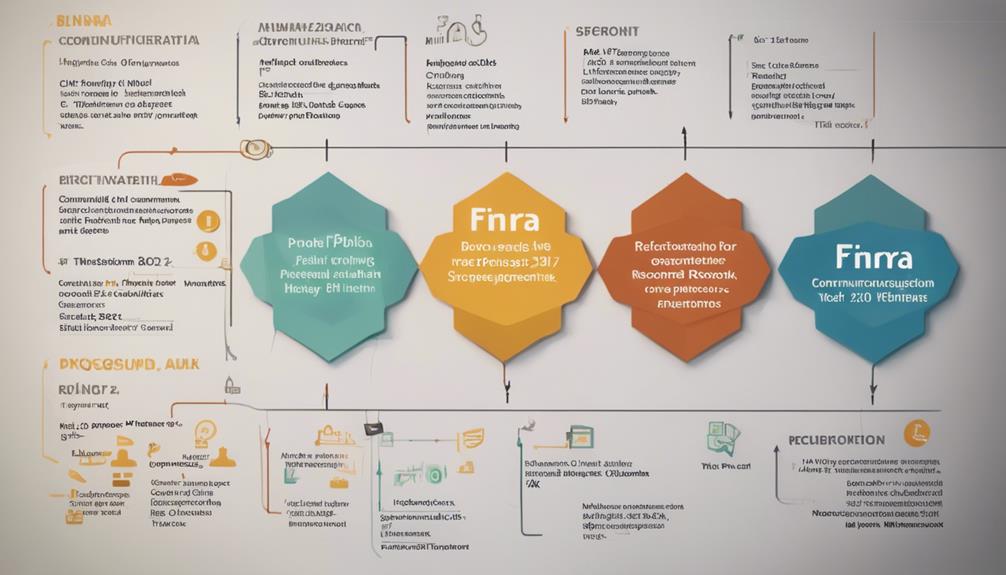Understanding the key rules of FINRA is crucial for ensuring compliance with Bitcoin IRAs. Rule 2210 establishes the criteria for transparent and unbiased member communications, emphasizing the importance of accuracy. Companies involved in Bitcoin IRA activities need to prioritize compliance to avoid serious penalties for non-compliance. Retail communications should clearly differentiate between offerings, avoid making misleading claims, and provide transparent explanations of risks. Recent updates underscore the significance of adhering to communication standards to protect investors. Familiarizing oneself with KYC requirements, AML regulations, and customer communication rules is essential. Upholding regulatory standards promotes transparency, fairness, and risk management. Gaining a deeper understanding of regulatory frameworks can improve your knowledge of compliance.
Key Takeaways
- Know Your Customer (KYC) requirements for identity verification.
- Anti-Money Laundering (AML) regulations to prevent illicit activities.
- Suitability standards ensuring investments align with client needs.
- Customer communication rules for transparent and accurate information.
- Record-keeping obligations to maintain documentation for compliance.
FINRA Rule 2210 Overview

Why does FINRA Rule 2210 play a crucial role in regulating communications by member firms with the public?
FINRA Rule 2210, a cornerstone of regulatory frameworks, lays down stringent guidelines for member firms' interactions with the public, especially retail investors. Adherence to Rule 2210 is essential to guarantee that information disseminated regarding crypto assets remains transparent, accurate, and unbiased.
This rule not only mandates the inclusion of fair, balanced, and precise content in public communications but also stresses the importance of steering clear of false, misleading, or overly promising statements. Member firms must provide clear and detailed descriptions of the risks, features, and safeguards associated with crypto asset products to ensure investors are well-informed.
With FINRA's recent examination revealing that nearly 70% of reviewed communications were at risk of violating Rule 2210, the significance of adherence to these compliance standards can't be overstated. It underscores the critical role Rule 2210 plays in safeguarding investor interests and maintaining integrity in the financial marketplace.
Differentiating Affiliate Offerings

When considering affiliate offerings in the context of FINRA regulations, it's essential to understand the Affiliate Program Guidelines, Disclosures, and Relationships.
These elements play a significant role in ensuring compliance with regulatory standards and maintaining transparency in communications.
Affiliate Program Guidelines
Clear differentiation between crypto assets offered by affiliates and direct offerings is crucial to comply with FINRA regulations. Firms must guarantee that communications regarding crypto assets from affiliates are in full compliance with regulatory standards, particularly FINRA Rule 2210.
The recent FINRA exam discovered violations where firms failed to distinguish clearly between these assets, leading to misleading statements about their functionalities compared to cash equivalents. Lack of clarity in communications about the entity offering the crypto products and customer contact information also posed issues.
Disclosures and Relationships
In our examination of affiliate program guidelines, we identified significant challenges related to differentiating between crypto assets offered by affiliates and direct offerings, particularly in meeting FINRA Rule 2210 requirements.
When addressing disclosures and relationships in the domain of crypto assets, compliance with FINRA Rule 2210 is vital to guarantee transparency and avoid regulatory violations.
Misleading comparisons between crypto assets and traditional investments can lead to misunderstandings and misrepresentations, underscoring the importance of accurate communication. To maintain integrity and trust with investors, it's essential to provide clear explanations on how crypto assets operate and the associated risks.
Firms must be diligent in distinguishing between affiliate offerings and direct offerings to prevent any confusion or misconceptions.
Compliance With Regulations
To adhere with FINRA Rule 2210, firms must distinctly differentiate between crypto assets offered by affiliates and those offered directly. Failure to make this distinction in communications can lead to potential violations of FINRA rules, inviting regulatory scrutiny.
Clear communication is important to avoid misleading investors regarding the source of crypto assets. Compliance with regulations necessitates firms to accurately disclose the origin of these assets in communications, particularly to retail investors.
Without proper differentiation between affiliate-provided crypto assets and direct offerings, there's a risk of investor confusion and potential harm. Therefore, ensuring clear communication and transparent disclosures is essential for firms to adhere to regulatory requirements and maintain trust with investors.
False Claims About Crypto Assets

Misleading statements about crypto assets, such as implying they're equivalent to cash, can lead investors to misunderstand their true nature. When it comes to false claims about crypto assets, it's essential to be mindful of the risks involved.
Here are some key points to keep in mind:
- Misleading comparisons of crypto assets with other investments without providing a sound basis can create a false sense of security for investors.
- Some communications fail to clearly explain how crypto assets work and the risks associated with investing in them, potentially leading to uninformed decisions.
- Unclear descriptions of the protections of federal securities laws for crypto assets can misrepresent the level of regulatory oversight and investor safeguards.
- Violations of FINRA Rule 2210 in crypto asset communications involve lack of clarity in differentiating between assets from affiliates or third parties and those from the member, among other misleading practices.
Understanding these factors is vital for making informed decisions in the crypto asset market.
Misleading Statements on Securities Laws

Identified violations concerning the misrepresentation of federal securities laws protections for certain crypto assets were prevalent in the examined communications. Firms failed to provide clear explanations of how federal securities laws apply to crypto assets, leading to misunderstandings among investors.
Misleading statements about the safeguards offered by federal securities laws for crypto assets were a common issue found, indicating a need for improved transparency and accuracy in communication. The lack of clarity on the regulatory framework and protections provided by federal securities laws for certain crypto assets is a critical concern that needs to be addressed promptly.
The examined communications lacked accurate information on how federal securities laws govern the issuance and trading of specific crypto assets, highlighting the importance of ensuring that investors receive clear and reliable information. Moving forward, it's essential for firms to provide accurate and clear explanations regarding federal securities laws to prevent misunderstandings and potential violations.
Compliance Importance for Firms

Compliance with FINRA rules is essential for firms venturing into Bitcoin IRA activities, ensuring adherence to regulations and fostering trust with clients.
Firms must prioritize following these rules to maintain transparency and protect investor interests in Bitcoin IRA products.
Failure to comply with FINRA regulations can result in severe penalties and regulatory consequences, emphasizing the critical role of compliance in the cryptocurrency investment landscape.
Regulatory Compliance Obligations
When participating in digital asset activities, firms must guarantee strict adherence to all applicable FINRA rules and laws. To ensure regulatory compliance obligations are met, firms engaging in digital asset activities need to contemplate the following key points:
- Compliance with federal laws is a must for digital assets meeting security definitions.
- Utilize frameworks available to analyze digital assets as investment contracts for regulatory compliance.
- Stay informed about joint statements addressing regulatory concerns related to digital asset securities.
- Notify FINRA promptly about various digital asset activities to guarantee ongoing regulatory compliance.
Penalties for Noncompliance
We must prioritize strict adherence to FINRA rules to avoid penalties for noncompliance in the crypto asset space.
Noncompliance with FINRA Rule 2210 on crypto asset communications can lead to penalties and enforcement actions. Firms must guarantee compliance with regulatory obligations to steer clear of potential harm stemming from misleading crypto asset communications. Violating Rule 2210, which includes making false claims and misleading comparisons, may result in regulatory scrutiny and disciplinary actions.
It's essential for firms to communicate clearly and transparently about risks, features, and regulatory protections to evade penalties for noncompliance. Prioritizing adherence to FINRA rules is important for upholding investor protection and regulatory compliance in the crypto asset domain.
Retail Communication Best Practices

In retail communication best practices, maintaining transparency and accuracy is essential for compliance with FINRA rules regarding crypto assets. When crafting communications concerning crypto assets, it's vital to adhere to disclosure standards to protect investors and maintain regulatory compliance.
To enhance the effectiveness of retail communication in the crypto space, consider the following best practices:
- Clearly differentiate between affiliates' crypto assets and direct offerings to avoid confusion.
- Avoid making misleading claims about crypto assets, such as equating them to cash, to provide accurate information to investors.
- Provide clear and detailed explanations of the risks associated with investing in crypto assets to ensure investors are well-informed.
- Regularly review and supervise retail communications on crypto assets to identify and rectify any potential violations of FINRA rules, safeguarding investors' interests.
Evolving Crypto Market Impact

The evolving crypto market has greatly influenced FINRA's approach to regulating member firms' communications regarding crypto assets.
With the surge in retail investor involvement in crypto assets, FINRA has sharpened its focus on examining how member firms communicate about these products.
The review period of the targeted exam from July 1 to September 30, 2022, sheds light on potential violations of Rule 2210 in over 70% of the communications scrutinized.
Market Volatility Trends
Traversing the volatile terrain of the evolving crypto market demands astute risk management and agile decision-making strategies. In this dynamic landscape, keeping a close eye on market volatility trends is essential for informed investment decisions. Here are some key points to take into account:
- Continuous Monitoring: Stay vigilant about market fluctuations to adapt quickly.
- Diversification: Spread investments across different assets to mitigate risk.
- Technical Analysis: Utilize tools to analyze price patterns for strategic moves.
- Stress Testing: Prepare for various scenarios to evaluate potential impacts.
Regulatory Compliance Updates
Mastering the challenges of the evolving crypto market, particularly in light of regulatory compliance updates, demands a keen awareness of shifting dynamics and a commitment to transparent communication.
The recent FINRA exam from July 1 to Sept. 30, 2022, focused on retail communications by member firms, stressing the importance of clear descriptions of risks and features in crypto asset communications. Compliance with FINRA Rule 2210, ensuring fair, balanced, and fact-based communication, was a primary area of scrutiny.
Identified misleading statements regarding protections for certain crypto assets underscore the necessity for accurate and transparent communication. Firms were advised to uphold Rule 2210 compliance in their communications to rectify potential violations and safeguard retail investors in the evolving crypto market.
Investment Diversification Benefits
Exploring the evolving crypto market impact on investment diversification presents new opportunities for investors looking to expand their portfolios. Incorporating Bitcoin IRAs into retirement savings strategies can offer a range of benefits, including diversification beyond traditional assets.
Here are four key points to keep in mind:
- Bitcoin IRAs provide exposure to a new asset class, potentially enhancing portfolio growth.
- Diversifying with cryptocurrencies like Bitcoin can help hedge against risks in traditional markets.
- Understanding regulatory rules, such as those set by FINRA, is essential when navigating the evolving crypto market.
- The growing interest in cryptocurrencies underscores the relevance of diversification benefits from Bitcoin IRAs in aligning with changing investment trends.
Increased Retail Investor Participation

With the surge in retail investor interest, the landscape of Bitcoin IRAs is experiencing a notable shift towards greater involvement from individual investors seeking to include digital assets in their retirement portfolios.
As retail investor participation in crypto assets grows, regulatory scrutiny and oversight have increased to safeguard investors from potential risks in the crypto asset market. Retail investors are increasingly engaging in Bitcoin IRAs as they aim to diversify their retirement portfolios with digital assets like Bitcoin.
This rise in retail investor participation has prompted a focus on regulatory compliance to guarantee transparency, protection, and fair practices in the Bitcoin IRA space. Regulatory bodies like FINRA are closely monitoring the growth of retail investor involvement in Bitcoin IRAs to uphold market integrity and safeguard investor interests.
As the interest from retail investors continues to grow, ensuring investor protection remains a key priority for regulatory authorities in the evolving landscape of Bitcoin IRAs.
Recent FINRA Report Findings

Amid the surge in retail investor interest driving greater involvement in Bitcoin IRAs, recent findings from a FINRA report highlight concerning violations of communication standards within the crypto asset space. The report revealed that 70% of the reviewed materials showed potential violations of FINRA Rule 2210, emphasizing the importance of adhering to regulatory guidelines. Here are some key points from the report:
- The targeted exam on crypto asset communications, initiated in November 2022, aimed to evaluate member firms' compliance with communication standards.
- Over 500 crypto asset-related retail communications were scrutinized during the exam period spanning from July 1st, 2022, to September 30th, 2022.
- Identified violations included the failure to differentiate between crypto assets offered by affiliates or third parties and those provided directly by the member firms.
- Misleading comparisons, false claims, and unclear explanations of crypto assets' risks and features were prevalent issues found during the sweep on crypto asset communications.
These findings underscore the necessity for clear and accurate communication in the crypto asset space to protect investors and maintain market integrity.
Ensuring Clear and Accurate Communication

How can regulatory compliance in communication standards be enhanced for crypto asset-related retail communications?
In the domain of crypto asset communications, adherence to FINRA Rule 2210 is paramount to guarantee transparency and accuracy. Recent findings from FINRA's sweep review underscore the importance of complying with Rule 2210, which mandates fair, balanced, and fact-based communication regarding crypto assets.
The review of over 500 retail communications revealed concerning violations, such as the lack of clarity in distinguishing offerings and misleading comparisons with other assets. These breaches not only included false claims but also failed to provide clear descriptions of risks and features, potentially putting retail investors at risk.
To address these issues, firms must prioritize compliance with Rule 2210, ensuring that their communications are clear, accurate, and devoid of misleading information. By enhancing regulatory practices in communication standards, firms can safeguard investors and uphold the integrity of the crypto asset market.
Frequently Asked Questions
What Is FINRA Rule 3210?
FINRA Rule 3210, known as the 'Public Appearance Rule,' mandates registered persons to notify their firm before engaging in public appearances discussing securities.
This rule promotes investor protection by enhancing transparency and oversight of registered individuals' communication activities.
Firms must establish supervisory systems to guarantee compliance with Rule 3210, covering seminars, webinars, and media appearances.
This regulation aims to uphold ethical standards and maintain integrity within the financial industry.
What Is FINRA Rule 4512 Requirements?
When it comes to FINRA Rule 4512 requirements, firms must diligently maintain accurate customer information, including essential details like name, address, and date of birth.
Keeping this data current and precise is important for effective communication, regulatory compliance, and ensuring that investment recommendations are suitable.
Adhering to Rule 4512 not only helps manage risks and prevent fraud but also aids in the proper supervision of customer accounts to avoid potential regulatory sanctions or fines.
What Is the FINRA Rule 5130?
Finra Rule 5130 regulates new securities issuance, aiming to prevent unfair practices in the primary market. It prohibits certain individuals and entities from participating in new offerings, ensuring fairness, transparency, and investor protection.
This rule is essential for market integrity, preventing manipulation and supporting a level playing field. Compliance with Rule 5130 is critical for maintaining trust in the capital markets and safeguarding investor interests.
What Is the Rule 3110 for Finra?
Rule 3110 for FINRA mandates member firms to establish a supervisory system ensuring compliance with securities laws. This rule requires written supervisory procedures to oversee associated persons' activities, with a designated principal approving certain actions to comply with FINRA regulations.
What FINRA Rules Should I Know When Considering a Bitcoin IRA?
When considering a Bitcoin IRA, it’s crucial to be aware of the bitcoin IRA regulations IRS guidelines set by FINRA. Understanding the rules around cryptocurrency holdings, reporting requirements, and tax implications can help you make informed decisions and ensure compliance with regulatory standards.
Conclusion
In summary, understanding key FINRA rules is essential for individuals looking to invest in Bitcoin IRAs. Just like a well-tuned engine drives a car smoothly, abiding by these regulations guarantees a safe and compliant investment journey.
By staying informed and compliant, investors can navigate the ever-changing crypto market with confidence and security. Remember, knowledge is power in the world of Bitcoin IRAs.











